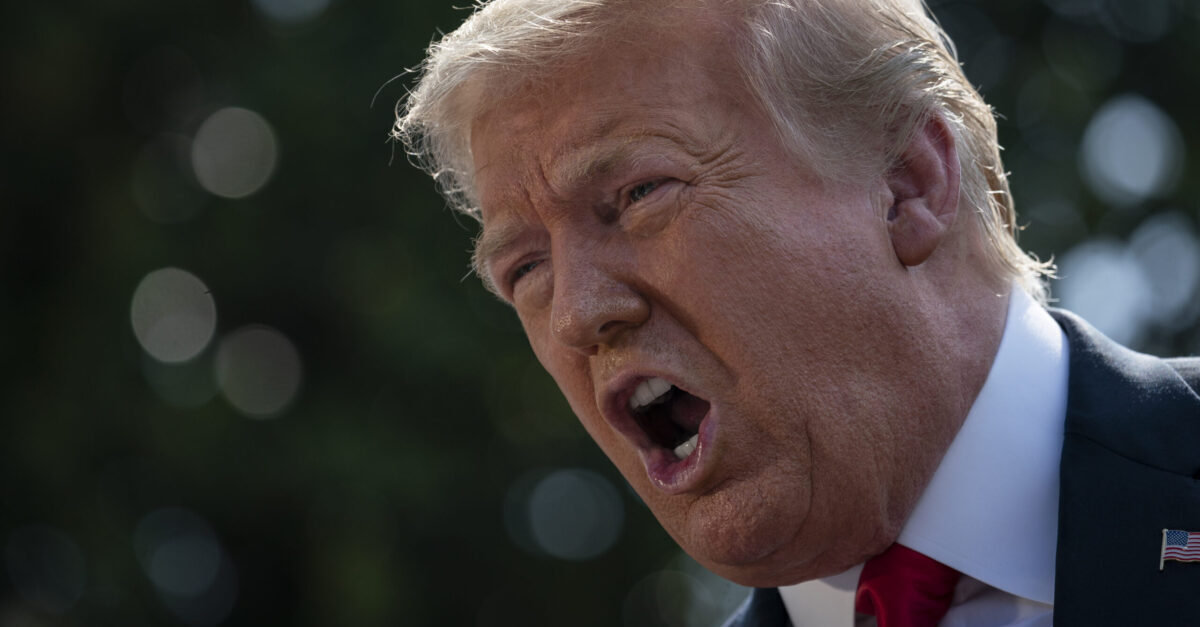
It’s hard to keep track of everyone who has accused everyone else of treason these days. Added to the list of people President Donald Trump has accused of this serious constitutional crime is a Black Lives Matter leader. Under federal law, treason is punishable by death. Let’s examine both the facts and the substantial legal barriers preventing this scenario from occurring.
The accusation was, naturally, levied via tweet, not via indictment: “Black Lives Matter leader states, ‘If U.S. doesn’t give us what we want, then we will burn down this system and replace it,'” Trump tweeted Thursday afternoon. “This is Treason, Sedition, Insurrection!”
The Fox News Channel Interview
The Trump tweet on Thursday followed a Fox News Channel interview Wednesday night with Hawk Newsome, the chair of Black Lives Matter in Greater New York.
The combative interview at times forced Fox News host Martha MacCallum to backtrack. It revolved around questions of violence, protests, Dr. Martin Luther King Jr., and even Christian faith.
Newsome admitted at one point saying that “if this country doesn’t give us what we want, then we will burn down this system and replace it.” He said he could be speaking “figuratively” or “literally.”
Newsome snapped back at McCallum’s questions about violence which were aimed at him as “extremely hypocritical” given the American government’s use of violence domestically and abroad. Newsome also said “nobody’s talking about ambushing police officers,” but rather about “protecting lives.”
Newsome incessantly asked McCallum if she supported the Second Amendment; she stalled on the question.
The Law
As Law&Crime has explained far too many times already, treason, the only crime contained within the U.S. Constitution, is defined in Article III, Section 3. It is defined as follows:
Treason against the United States, shall consist only in levying war against them, or in adhering to their enemies, giving them aid and comfort. No person shall be convicted of treason unless on the testimony of two witnesses to the same overt act, or on confession in open court.
The Congress shall have power to declare the punishment of treason, but no attainder of treason shall work corruption of blood, or forfeiture except during the life of the person attainted.
Congress set the punishment for treason in a federal statute, 18 U.S.C. § 2381. The punishment is “death” or “not less than five years” in prison and a fine of “not less than $10,000.” Whoever commits treason “shall be incapable of holding any office under the United States,” the statute also says.
Treason is supposed to be difficult to prove in order to prevent politicians from using its implications to bludgeon or execute their political rivals.
The words of the U.S. Supreme Court in Cramer v. U.S. (1945) are important in this climate. Here, the court pulls back the veil of history to examine the legal underpinning of treason law dating back to European monarchies and examines it through the lens of competing factions during the American Revolution. Here is the court’s analysis of that time in the late 1700s:
Many a citizen in a time of unsettled and shifting loyalties was thus threatened under English law which made him guilty of treason if he adhered to the government of his colony and also under colonial law which made him guilty of treason if he adhered to his king.
The court in that case then noted that America’s treason laws were strikingly different from those of monarchies and that the laws of other countries were helpful only as examples of what America should not do:
Historical materials are, therefore, of little help; necessity as well as desire taught a concept that differed from all historical models in the drafting of our treason clause. Treason statutes theretofore had been adapted to a society in which the state was personified by a king, on whose person were focused the allegiances and loyalties of the subject. When government was made representative of the whole body of the governed, there was none to say “I am the State” and a concept of treason as compassing or imagining a ruler’s death was no longer fitting. Nor can it be gainsaid that the revolutionary doctrine that the people have the right to alter or abolish their government relaxed the loyalty which governments theretofore had demanded — dangerously diluted it, as the ruling classes of Europe thought, for in their eyes the colonists not only committed treason, they exalted it. The idea that loyalty will ultimately be given to a government only so long as it deserves loyalty and that opposition to its abuses is not treason has made our government tolerant of opposition based on differences of opinion that in some parts of the world would have kept the hangman busy. But the basic law of treason in this country was framed by men who, as we have seen, were taught by experience and by history to fear abuse of the treason charge almost as much as they feared treason itself.
Thus the constitutional difficulty that there be two witnesses to the same overt act. (The Cramer court reversed the conviction of someone convicted of treason because the evidence was insufficient.)
The Growing List of the Accused
By being accused by Trump, BLM leadership has plenty of company. Here is a non-exhaustive list of people President Trump has thus far accused of treason. (In the case of one company, Trump suggested that a treason investigation should be commenced.)
A Black Lives Matter leader President Barack Obama Whistleblower attorney Mark Zaid FBI lawyer Lisa Page Fmr. FBI Deputy Director Andrew McCabe Rep. Adam Schiff (the California Democrat who led impeachment proceedings against Trump) House Speaker Nancy Pelosi Those who ascribed to the “Russia Hoax” (several iterations of this accusation have been lodged) Those who “spied” on his campaign The New York Times Google (investigation suggested) Democrats who disagree with his policies concerning the border
[photo by Drew Angerer/Getty Images]